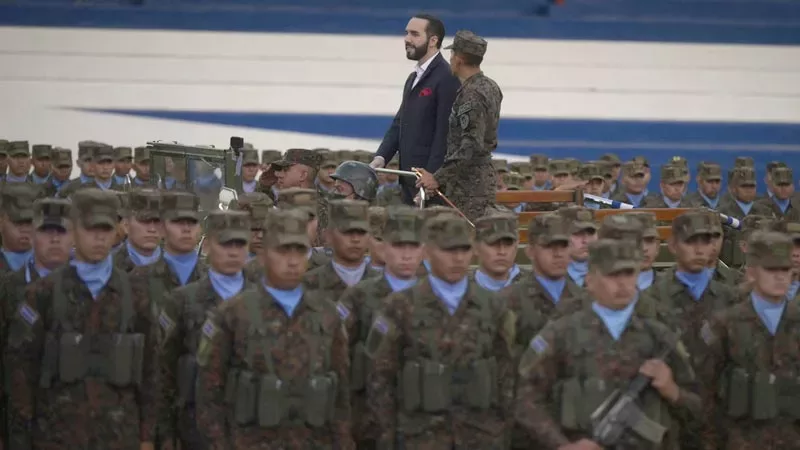The Asamblea Legislativa (Legislative Assembly) revisited the reforms to the Ley de la Carrera Militar (Military Career Law) that were approved in December 2024 but did not take effect due to an observation submitted by the Presidency. That observation was taken up and approved in today’s plenary session, clearing the way for the changes to take effect once they are published in the Diario Oficial (Official Gazette).
The reforms expand the number of military ranks within the Armed Forces, including a specific promotion for the Minister of Defense and another for the Deputy Minister and the Chief of the Joint Staff of the Armed Forces.
Accordingly, the high command structure will be modified, creating the highest ranks of General of the Army (ground forces), General of the Air Force, and Admiral (National Navy). This highest rank will be held by the Minister of Defense, corresponding to his branch of service. In the case of Merino Monroy, the incumbent minister, his promotion will be to Admiral, as he belongs to the National Navy.
Additionally, the law’s Article 59 is being amended to allow the Deputy Minister of National Defense or the Chief of the Joint Staff of the Armed Forces to be promoted to the rank of Major General, Aviation General, or Vice Admiral. This promotion can occur after they have served in their posts for at least one year and upon the recommendation of the Minister of Defense.
The reforms also create the ranks of Brigadier and Commodore. Officers at the rank of Colonel or Navy Captain may be promoted to these new ranks upon being appointed commanders-in-chief of the Army and the Air Force.
Furthermore, the decree revises officers’ time-in-grade requirements as follows: The requirement for Second Lieutenant is reduced from 5 to 3 years; Lieutenant, from 6 to 4 years; and Captain, from 6 to 5 years. Conversely, the requirement for Lieutenant Colonel increases from 6 to 7 years, and for Colonel, from 6 to 10 years. The 7-year service requirement for the rank of Major remains unchanged.
The decree also establishes new conditions for those who wish to pursue university degrees. Military personnel in combat arms categories will retain their classification when assigned to pursue studies related to their branch or specialty. However, junior officers up to the rank of Lieutenant, as well as cadets, who begin studies in non-military fields will be transferred to a service support category.
Retoman reformas a la carrera militar que promueven de rango a ministro y altos mandos de las Fuerzas Armadas
La Asamblea Legislativa retomó las reformas a la Ley de la Carrera Militar que fueron aprobadas en diciembre de 2024, pero que no entraron en vigencia debido a una observación realizada por la Presidencia. El comentario se conoció y avaló en la sesión plenaria de hoy, dando luz verde para que comience la aplicación de los cambios una vez sean publicados en el Diario Oficial.
Las reformas amplían el número de rangos militares dentro del Ejército, incluyendo una promoción específica para el ministro de Defensa y otra para el viceministro y el jefe del Estado Mayor Conjunto de la Fuerza Armada.
En ese sentido, la estructura de los altos mandos se modifica, creando como rango más alto el de general del ejército (fuerzas terrestres), general del aire (Fuerza Aérea) y almirante (Marina Nacional), el cual corresponderá al ministro de Defensa, según la rama a la que pertenezca. En el caso de Merino Monroy, actual titular de la cartera, su ascenso será a almirante, pues pertenece a la Marina Nacional.
Además, se incorpora una modificación al artículo 59 de la ley para que quienes desempeñen el cargo de viceministro de la Defensa Nacional o jefe del Estado Mayor Conjunto de la Fuerza Armada puedan ascender al grado de general de división, general de aviación o vicealmirante, después de haber permanecido en sus cargos como mínimo un año y a sugerencia del Ministro de Defensa.
Además se crean los cargos de brigadier y comodoro, a los cuales podrán ascender los oficiales en el grado de coronel o capitán de navío, que fueren nombrados como comandantes en jefe del Ejército y la Fuerza Aérea.
Por otro lado, el decreto reforma el tiempo de servicio de los oficiales, de la siguiente manera: subteniente pasa de 5 a 3 años; teniente, de 6 a 4 años; capitán, de 6 a 5 años; teniente coronel, de 6 a 7 años; y coronel, de 6 a 10 años. En el caso del rango de mayor, se mantienen los 7 años de servicio ya establecidos.
El decreto además establece nuevas condiciones para quienes deseen estudiar carreras universitarias. Los militares pertenecientes a la categoría de las Armas mantendrán esa categoría cuando sean destinados a cursar estudios afines a su arma o especialidad. Pero los oficiales subalternos el rango de teniente y cadetes que incien una carrera en otros ámbitos no militares serán transferidos a la categoría de los servicios.

